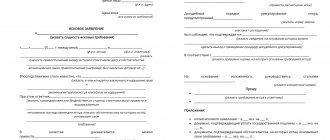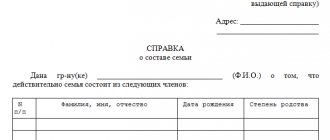Priority categories
The circle of persons determined by the law directly related to the 1st stage certainly includes:
- spouses;
- children;
- parents.
Moreover, the following rules apply to spouses:
- the 1st stage includes the spouse who, at the time of the death of the person providing the inheritance, was in an officially registered marriage with him, according to state standards;
- Civil, married or former (in a state of divorce) spouses are not included in the general order of priority.
The following rules apply to children:
- children whose birth occurred within the framework of an official marriage union, whose relationship with the testator is precisely established or beyond doubt, are considered to be from any marriage;
- children who were born outside the procedure of official marriage, and in their relation it was established judicially or voluntarily that they were related to the deceased person providing the inheritance;
- children for whom the grantor of the inheritance does not have parental rights are not excluded from the first category;
- natural children born after the death of the person providing the inheritance, no later than ten months from the event.
IMPORTANT: Adopted children are of particular importance. Adoption is a procedure approved by the court, and the adoptee has the opportunity to maintain legal relationships based on blood kinship. That is, the adopted person has a choice - to inherit from his adoptive parent, or to remain the heir of his blood parent.
In terms of parents:
- adoptive parents and natural parents whose child died before them belong to the 1st stage;
- no importance is attached to the parents' marital status, their marital status and other similar circumstances;
- children cannot inherit from parents who have been deprived of parental rights by law.
We talked in more detail about how the inheritance of parents is divided between children and vice versa, and here you will find out what share of the testator’s property the spouses can claim.
Conditions of the procedure and persons having rights
If inheritance in the 1st order occurs in the absence of a will of the deceased, everyone who belongs to this order has an equal share.
Respectively:
- natural or adopted children, even if parental rights have been terminated;
- parents or adoptive parents;
- legally married spouses.
There is also a wide category of persons who have the opportunity to be considered among the priority ones:
- dependents;
- heirs by nomination.
Persons who meet the following criteria may be classified as dependents:
- the dependent must be considered incapacitated due to age (child or pensioner) or for other reasons (disability);
- material support (financial or in kind) from the deceased, providing an inheritance in relation to a dependent, should be the basis for the latter’s livelihood;
- the dependent must be supported for a year or more before the death of the testator;
- if the dependent does not belong to the category of relatives of the testator, he must have lived with him in the same living space for a year or more before the death of the latter.
IT IS WORTH UNDERSTANDING: The category of heirs by representation includes groups of persons who can, due to circumstances established by law, transfer their right of priority to categories of the second (less often than others) priority.
A classic example is children who die before their parents and pass on their priority to their children, that is, to the grandchildren of their parents; the transfer of priority to great-grandchildren can also continue.
The number of persons who do not have the right to receive an inheritance under the 1st category includes:
- parents deprived of rights in an attempt to inherit for their children;
- dependents who are not blood relatives and have not lived for a year with the person providing the inheritance;
- heirs of the 1st stage, bypassed under the terms of the will;
- inheritors unworthy by law.
As part of the will, it is possible to remove legally capable adult heirs of the 1st stage ; dependents, disabled people, children (under 18) and equally socially vulnerable categories have a guaranteed share when receiving an inheritance.
Inheritance by will
Personal relationships with children, preferences regarding the division of property, a new family, become the reason for drawing up a will. When preparing a document, you need to take into account personal preferences and legal regulations. The state strictly protects the rights of socially vulnerable categories of citizens. The text of the will cannot deprive the rights of inheritance of young children, disabled sons, daughters, spouses, or parents. The will of the owner cannot change the fact. Such a document is considered invalid.
A father's will can fundamentally change how property is distributed.
According to the will, property is divided not only between relatives. The text of the will appoints any citizen, organization, or state as a successor. A prerequisite for drawing up a document is to take into account the interests of applicants for the mandatory part. These include disabled parents, children, spouses, and dependents of the deceased. Disability is determined by age and health status. Young children are included in the list of applicants for the allocation of a mandatory share.
Recommended reading: Queue of inheritance by law scheme
The contents of a will can be challenged in court in certain situations, for example when:
- the text of the will does not take into account the interests of applicants for the allocation of the obligatory part,
- the signature does not resemble the handwriting of the deceased,
- the state of mental health of the deceased was questionable.
If there are strong arguments, the court will recognize the invalidity of the document.
How is property divided among first-degree heirs?
The division of the inheritance in the 1st stage without a will occurs in equal shares, according to the will - as indicated in it, minus the shares of socially vulnerable categories, if any.
Each heir of the 1st priority has the opportunity to first acquire the inheritance in full in shares equal to the rest of the first priority. That is, persons of the second and further priority will be able to receive the inheritance only in the absence of heirs of the 1st priority or if one of the first priority renounces their rights in their benefit.
There are a few exceptions:
- heirs by nomination, if there are several of them, have the right to an equal division of the share of the total inheritance that was due to the transferor of his right;
- in any conditions, a dependent who has no other rights to inherit other than his status has the right to no more than a quarter of the inheritance, even if there are no other representatives of the 1st stage.
During the inheritance procedure, it is worth taking into account the status of the current spouse. The spouse belongs to the usual category of first-priority heirs, but at the same time has the right to all property acquired during the marriage (common/joint).
That is, in relation to property acquired during marriage, after the death of one of the spouses, the second first allocates his share, and then receives the right to claim a share from the equal division of the second part among all the first-priority ones. You will find more information about the rights of one spouse to property left after the death of the other in this article.
Property that is not part of the jointly acquired property (donated, acquired outside of marriage, etc.) is divided on an equal basis among all priority property.
If there is a will that bypasses the primary heirs, the following have the right to inheritance in the amount of half of their total share in the total inheritance:
- a spouse who, at the time of the death of the testator, was incapacitated for work;
- parent with disabled status;
- children – in the status of disabled or minors.
Who else has the right to receive the inheritance first?
Have the right to receive their part of the inheritance along with the children and parents of the deceased and distant relatives or no relatives at all, whom he supported for at least a year, that is, his dependents. This could be a child or an incompetent adult who was a dependent according to documents from the guardianship authorities, or their maintenance of the deceased was confirmed by witnesses.
If the child was adopted or adopted, then he or she inherits after the adoptive father along with natural children, if any.
The adoptive parent has the right to receive an inheritance if he has survived his son or daughter.
Algorithm for distribution of bequeathed property
The division of the property of the deceased person providing the inheritance, in the first place, occurs in equal shares among all priority heirs and further by categories (from the second to the seventh) if there were no priority ones by law, or by will, as it establishes, with the exception of the shares of those who have guaranteed right to claim inheritance.
You can enter into the right of inheritance within six months from the moment the fact of death was recorded.
General points to consider:
- primary heirs have the right to renounce their share altogether or in favor of another person;
- if none of the 1st priority heirs has declared the use of their right, in the next six months, after the expiration date of the first, the second priority ones can declare their right;
- the six-month period can be counted from the moment the death is registered, as well as from the moment the target person is declared missing or dead by the court;
- the primary heir can assume his rights even later than six months if he has a good reason (absence, business trip, late receipt of information about death, etc.);
- an unborn baby heir of the 1st stage enters, through an intermediary, into the inheritance after birth, even if the period of six months has already passed;
- With the help of a will, you can return the right of inheritance to an unworthy heir of the 1st stage and restore his equal rights.
The procedure for entering into inheritance is as follows:
- collect a package of documents required by the notary and the state. organs.
- Carry out, by requesting the appropriate service from a notary's office, a check of the presence/absence of a will in order to understand the responsible person to whom you should contact for the inheritance. If there is a will, go to the notary who is in process of it. If absent, go to the district notary at the place of residence of the testator.
- Within the specified six-month period, an application is submitted to the responsible notary to ensure their rights.
- Pay for notary services. Heirs of the first stage, according to existing legislative norms, pay a state duty in the amount of 0.3 percent of the amount of the accepted inheritance, with no more than 100 thousand rubles, benefits are provided for the disabled and minors.
- Carry out the procedure for registering the rights of ownership of inherited property 6 months after opening.
Required documents:
- each heir must provide a document confirming his identity - usually a passport or birth certificate for minors;
- a photocopy and original of a certificate confirming the fact of the death of the testator;
- house register or certificate from the place of permanent registration - a photocopy and original for the deceased and the relatives who lived with him;
- certificates confirming the fact of parental or marital ties with the deceased - about marriage and birth, respectively;
- the dependent must provide evidence of cohabitation and dependency;
- disabled people – documents on disability and their copies;
- if inheritance occurs later than 6 months. – documents confirming the presence of a valid reason for being late.
The procedure for accepting an inheritance is completed within six months after the opening of the inheritance or later, depending on the circumstances. Accordingly, you can become a driver in six months.
Carrying out the procedure
The stage under consideration includes general provisions. They are regulated by current legal acts. To formalize rights regarding the mass, you need to declare this. This happens at the address where the hereditary mass is open. For this purpose, a corresponding application is sent to the notary's office. This can be done in person or by mail. In the latter case, the citizen’s signature must be notarized. The procedure in question will take six months.
ATTENTION !!! After the specified period has passed, the citizen is issued a certificate indicating the existence of rights to property belonging to the deceased. The notary is given documentation confirming that the deceased has rights to certain items. Citizens classified as the first category of heirs will need to confirm their rights to receive the estate. The legislation reflects that it is necessary to indicate the presence of family ties between the successor and the deceased. For this purpose, an act certifying the conclusion of the marriage relationship is prepared. In addition, documentation indicating the fact of the birth of children can be confirmation.
In addition to the specified papers, an act is required to verify the identity of the applicant. You will need to take a certificate from the address where the citizen recently lived. If during the period of time reflected in the law, the presence of representatives of the main priority is not revealed, then the next category of citizens will inherit. Each person has the opportunity to form a waiver of his share of the property mass. It is subject to division among the remaining heirs.
IMPORTANT !!! If no successors have been found within six months, then the property becomes the property of state bodies.
Sometimes deadlines are violated due to valid reasons. Then the person has the right to restore it. Such grounds include a person's prolonged stay outside the country, undergoing treatment, etc. If the deceased has a child who was not born, then the timing may shift until the child is born.
On what grounds can they refuse and what should they do?
The reasons and grounds for refusal to grant an inheritance may be the following:
In turn:
- lack of necessary documentation - this issue can be resolved by providing the missing documents or through legal action.
- Lack of evidence of relationship - can be resolved by providing additional documentation, ordering examinations, or judicial procedure. You can read about the procedure for establishing family relationships here.
- Delay - missing a deadline of 6 months becomes grounds for believing that the heir has renounced his share; the problem can be resolved in court with the provision of documentation justifying the delay.
- Persons who have been found to have evaded the duties of caring for the person providing the inheritance may be excluded from inheritance by court order.
In case of refusal of inheritance under a will:
- You can seek half the share for dependents, disabled people and minors;
- you can try to challenge the will in court;
- You can try through judicial procedure, questioning witnesses and expert examination to have the will declared invalid (written under influence or coercion, not in sober memory, etc.).
Who will get the property if there are no heirs in the first place?
In the absence of heirs of the 1st stage, the inheritance is transferred to the heirs of the second stage and further according to the seven degrees of priority provided for by law.
The category of the second stage includes sisters or brothers (by full or incomplete relationship), parents of the parents of the person providing the inheritance, and also, after the death of sisters and brothers, nephews and nieces.
The third category includes aunts and uncles, or nephews. Dependent relatives recognized by law, regardless of the degree of relationship, remain in the 1st category.
Legislative regulation of the issue is undertaken by the Russian Civil Code in articles numbered 1142, 1143, 1144, 1145 and 1148.
The first priority in terms of receiving an inheritance are children and parents, wives and husbands, dependents; these categories have the right to receive inherited property in the first place, and only if they refuse or are absent can subsequent categories proceed to receive property.
Along with the above options, there is the possibility of dividing the inheritance by agreement. Read about it on the pages of our website. We also recommend studying other materials from our experts. From them you will learn about who has the right to inheritance by law and will and what are the features of the procedure for dividing property in such cases.
Rules of inheritance by law by priority applicants
Successors of the 1st stage have priority rights to receive inherited assets. They can be deprived of them only in the following cases:
- Adoption of a court decision declaring heirs unworthy;
- Failure of all applicants to contact the notary within the prescribed period, that is, failure to accept the inheritance;
- A renunciation of inherited property drawn up in accordance with the established procedure.
The emergence of these circumstances entails the emergence of rights to the wealth of second-tier applicants under the law.








